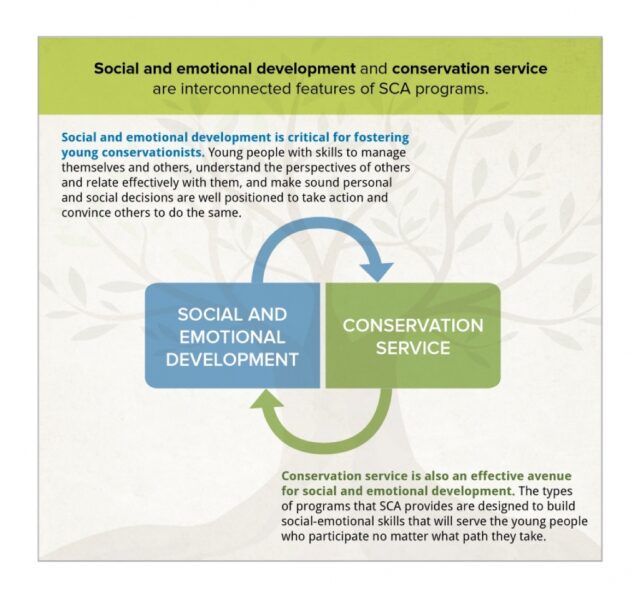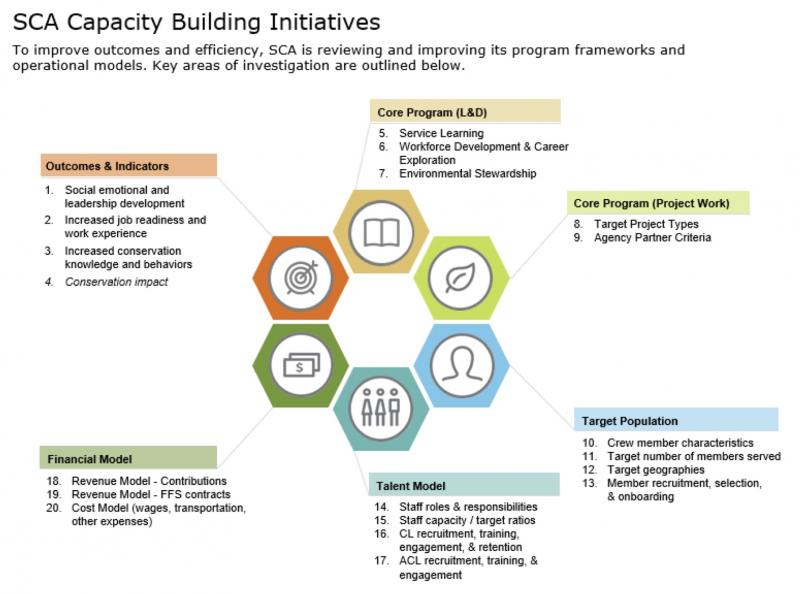Published in 2018
Mission statement
The Student Conservation Association’s (SCA) mission is to build the next generation of conservation leaders and inspire lifelong stewardship of the environment and communities by engaging young people in hands-on service to the land.
Core focus area
Founded in 1957, SCA is the nation’s leading youth conservation service organization, providing young people with opportunities to serve nature and to shape their futures. Through programs that mirror the diversity of the U.S. population, SCA strives for a world in which conserving the environment is a lifelong commitment shared by all young people as they enter their careers and assume the responsibilities of citizenship. By empowering young people through hands-on service to the land, participants come to understand that work that benefits other people, the natural environment, the community, or the world, is what unites us as a society.
Initially founded with a focus on clearing out the National Park Service’s maintenance backlog and conserving public lands, the organization has come to embrace the benefits of hard work of conservation service on the character and civic development of young people. All SCA programs provide youth and young adults with opportunities to develop their social, emotional, and leadership skills; engage in service learning projects; nurture job readiness skills and provide workforce development opportunities; and foster environmental stewardship. Together, these elements of SCA programming advance character development among youth participants while driving their passion for environmental stewardship and interest in conservation careers.
SCA’s work to evaluate and document character development outcomes has shown the powerful benefits of conservation service for character development. In response to this new understanding of its impact and potential to change the lives of young people, SCA made an organizational commitment to codify and strengthen the character-building aspects of its program.
This shift in focus is reflected in the organization’s guiding documents, both internal and external. The introduction to Lives and Lands: Celebrating 60 Years of the Student Conservation Association, notes that “SCA has always been larger than one issue or cause. We are a movement for America. As young people get their hands dirty in service, ensuring the health, resilience and positive future of our nations’ lands, they do the same for themselves. The result is not only a broad range of environmental improvements from the Alaskan tundra to the Mississippi Delta, but also a series of critical personal and professional advancements among tens of thousands of young volunteers.” In fact, these two outcomes are not just parallel: they are mutually reinforcing.
Through a series of capacity-building efforts, SCA is using data-driven understanding to articulate the research basis, structures, and means of continually improving the way the organization does business in order to achieve ever-greater character outcomes. Along with an assessment of program operations, these efforts will allow programs to rapidly increase in size and impact, ensuring that character outcomes are maximized for all participants.

Through a series of capacity-building efforts, SCA is using data-driven understanding to articulate the research basis, structures, and means of continually improving the way the organization does business in order to achieve ever-greater character outcomes. Along with an assessment of program operations, these efforts will allow programs to rapidly increase in size and impact, ensuring that character outcomes are maximized for all participants.

Articulate SCA Program Framework
SCA has developed a program framework that has a strong basis in research from related fields, such as service learning, environmental education, and developmental psychology. With a council of leading researchers in those fields, SCA has documented those links and articulated the practical wisdom that was part of SCA’s ‘oral tradition.’ By articulating the essential elements of each program, SCA’s program staff recognize more clearly the ways in which these place-based programs are consistent across program sites, landscapes, and audiences, and have a clear understanding of which aspects of the program should be standardized across individual sites, and which should be tailored to local contexts.
Build Capacity for Ongoing Evaluation and Learning
Updated systems – both technological and human – are equipping program managers to use data to improve the consistency and quality of program delivery at their sites. With the assistance of the firm Learning for Action, SCA has convened a department-wide program retreat to kickstart this cultural shift and has undertaken an organization-wide learning culture survey to establish a baseline for the work. SCA is now developing a performance measurement and management system to monitor program outcomes and fidelity of program to the program framework. Attentiveness to fidelity, as well as natural variation in program implementation, will allow staff to identify how different ‘recipes’ for program lead to success on the range of desired outcomes.
Refine Training Design
As a result of the improved program design and training refinement process, all SCA adult practitioners (program managers, crew leaders, and intern supervisors) will be better prepared to consistently incorporate the specific program practices that result in stronger character development and conservation outcomes into every SCA experience. SCA is refining training content and program content, including the administrative and content-based materials that guide practitioners. The performance measurement and management system will suggest areas to add or refine in the training materials. For example, evaluation results last year affirmed the value of developmental relationships to SCA’s program outcomes; training this year provides more explicit attention to crew leaders’ facilitation strategies.
Grow and Scale Programs Through Operational Efficiencies
SCA recognizes the value of relationships to its program outcomes; it makes sense that roughly two-thirds of program budgets are personnel (full-time SCA staff, seasonal field leaders, and participant wages or stipends). SCA is working with the Monitor Institute, Deloitte’s social sector consultancy, to identify ways to improve operational efficiency and to plan for program growth.
Share Promising Practices
As a result of the successful marriage of theory and practice in these capacity-building initiatives, SCA will develop a toolkit of materials that describes how to design and implement service-to-nature experiences that build character in youth and young adults. The toolkit will include relevant components of a revised field guide manual and a white paper that shares the findings of the project and expert advisory council work. A convening will bring together leaders and front-line practitioners from relevant organizations, and the toolkit will be made available to practitioners in the youth conservation service field.
Funding
This work is funded by grants from multiple foundations, drawing on and strengthening SCA’s public-private partnership funding model.
